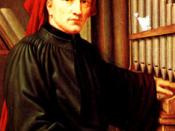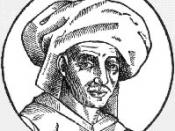A strong, characterized and poignant composition offers an unfathomable sum of knowledge to the listener, who must take in account the greater representation of the composer's style and what he's trying to convey to the listener. Josquin des Prez's Motet Miserere Mei Deus, based off of Psalm 51, is one of the most recognizable and praised motets of its time. The motet defines Josquin's unique style, which is clearly characterized by innovative use of repetition in the voices, blending traditional forms and innovating them in the process. Undoubtedly, Josquin's Miserere not only represents his character, but the troubled times that unfolded during the period of the composition's release. As previously stated, Josquin's motet presents a significant amount of knowledge to the listener, and also provided a lot of knowledge for the development of further styles utilized in the Renaissance Baroque, and even Classical periods.
To begin, Josquin uses imitation in the words and melodies in order to interlock and anchor all the voices together.
This pervasive repetition accentuates certain parts of the texts, and sets as well a flowing harmonic mood, since the same melody repeats itself and develops through the voices. The beginning of the motet starts with the first musical phrase of 8 notes, seven of them being the same, paired with the 8 syllable phrase, Miserere mei Deus (Lord have mercy on us), which is also repeated with the same sequence of notes over and over throughout the piece. It was not typical of Josquin to write 5 voice chansons, but in this motet, he simply adds a tenor who repeats the same phrase throughout the piece. The psalm contains 19 lines, where he interrupts a line twice in order for the refrain to repeat itself 21 times in the piece 1, although the harmonic structure...


